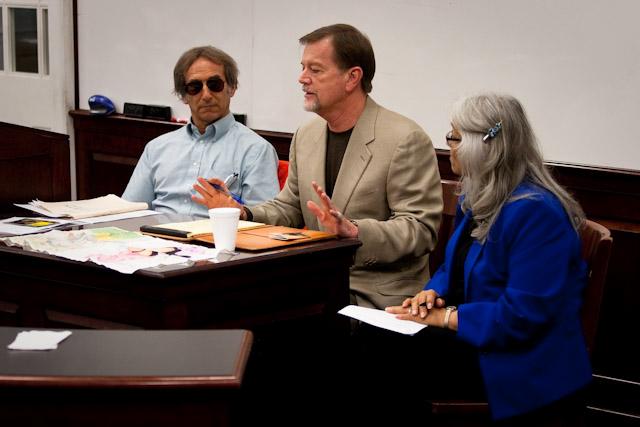
Randy Johnston, a local ethics attorney describes what it was like to see an execution during Wednesday’s panel. (Spencer J Eggers/The Daily Campus)
This month marks the 35th anniversary since the U.S. reinstated the death penalty with the execution of Gary Gilmore by firing squad in Utah in 1977.
Since then, 36 states have reimposed the death penalty, with Texas leading the way by far with the largest number of executions carried out since 1977.
Tuesday, Rodrigo Hernandez was put to death in Texas for a murder he committed 18 years ago, making him the 478th person to die in the state since the reinstatement.
By the end of February that number will rise to 481, with Gov. Rick Perry having signed off on nearly half of all of those executed in Texas.
Texas’ role as a leader in executions as well as increasing opposition to the death penalty as a form of punishment was the topic of the Death Penalty Panel held at SMU’s Dedman School of Law Wednesday afternoon.
President of SMU’s American Constitution Society and SMU Dedman School of Law J.D. Candidate Jay Forester coordinated the event with three speakers who are all opposed to the death penalty.
“Instead of a debate where people might have their pro death penalty beliefs affirmed, I wanted to host speakers who presented the other side but in three different ways, just in case something resonated with a person who was previously in favor of the death penalty,” Forester said.
Featured speakers included Randy Johnston, a Dallas attorney who specializes on legal ethics, Rick Halperin, director of SMU’s Embrey Human Rights Program and an expert on capital punishment and Victoria Palacios, associate professor of law at SMU and a former member of the Utah parole board.
All three members of the panel described their opposition to the death penalty, provided a brief background on the subject, discussed the different types of executions and spoke about their own experiences.
Both Johnston and Halperin have been witnesses to executions, while Palacios sat on the parole board determining whether to grant clemency or commute sentences for death row inmates.
The overwhelming theme of the panel was the emphasis on the inmates’ humanity.
Despite the heinous crimes committed by these prisoners, and the fact that they deserve to be punished for their crimes, the panel stressed that it is imperative to remember that they are still human beings.
“It is so important to humanize the defendants in these cases,” Palacios said.
However, the panel did not say the prisoners should be absolved of their crimes.
“I don’t have any problem putting guilty people away from society. The issue isn’t that we shouldn’t punish these people, but what we should do with them,” Halperin said.
The next panel will be held Feb. 2 at 7 p.m. The panel will feature two exonerees and a former death row chaplain.








